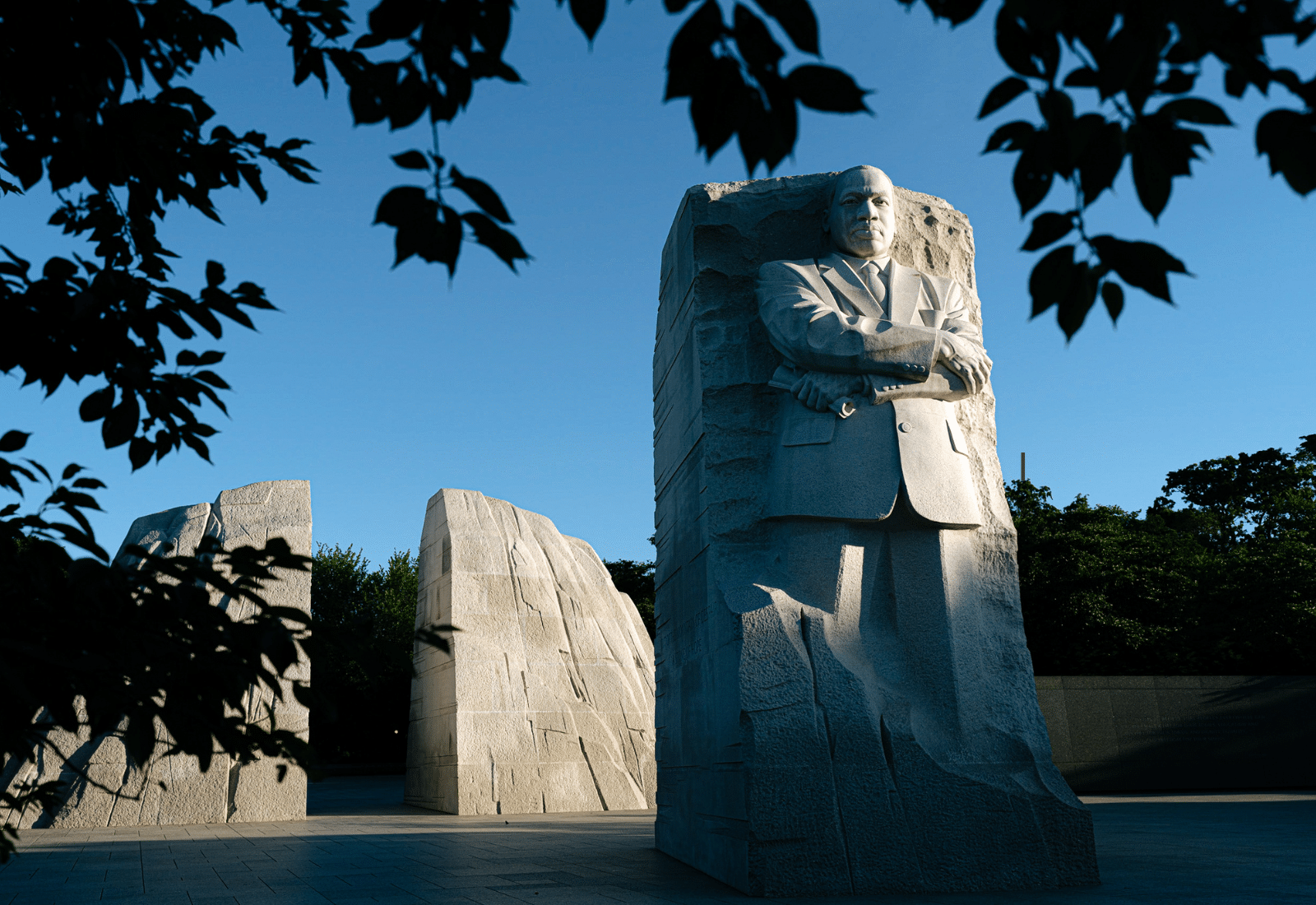Among its many stories is the profound and enduring impact of African Americans on the nation’s capital. From the contributions of enslaved laborers who helped build the city, to the vibrant cultural renaissance of the 20th century, African American history is deeply woven into the fabric of Washington, D.C. Read on to learn more.
The National Museum of African American History and Culture
Opened in 2016, the National Museum of African American History and Culture (NMAAHC) is a must-visit for anyone interested in the African American experience. Located on the National Mall, this museum is dedicated to documenting the history and culture of African Americans through a large collection of artifacts, exhibits, and interactive displays.
Exhibits to Explore
- Slavery and Freedom: This powerful exhibit covers the transatlantic slave trade, the Civil War, and the Reconstruction era. It offers a sobering look at the roots of African American history.
- The Civil Rights Movement: Explore the struggle for civil rights in the 20th century, featuring iconic figures like Martin Luther King Jr. and Rosa Parks, as well as key events like the March on Washington.
- Cultural Expressions: This vibrant exhibit celebrates the rich contributions of African Americans to music, art, literature, and sports, showcasing the cultural impact that continues to shape American society today.
The Martin Luther King Jr. Memorial
The Martin Luther King Jr. Memorial is one of the most poignant monuments in Washington, D.C. Located on the Tidal Basin, this memorial features a 30-foot statue of Dr. King, emerging from a “Stone of Hope.” The design of the memorial draws inspiration from Dr. King’s famous “I Have a Dream” speech.
Reflecting on Legacy
The memorial is not only a tribute to Dr. King’s life and work but also a space for reflection on the ongoing struggle for equality and justice. Visiting the memorial at sunrise or sunset offers a serene and moving experience. Consult with a private D.C. tour company about planning your visit at the right time of day.
U Street Corridor: The Black Broadway
The U Street Corridor, often referred to as “Black Broadway,” was once the heart of African American culture in Washington, D.C. During the early 20th century, this neighborhood was home to thriving businesses, theaters, and music venues that catered to the African American community.
Landmarks and Experiences
- The Lincoln Theatre: This historic theater has hosted performances by legendary artists such as Duke Ellington, Billie Holiday, and Louis Armstrong. It remains a key cultural venue today, offering a variety of performances from music to theater.
- Ben’s Chili Bowl: A visit to U Street wouldn’t be complete without stopping by Ben’s Chili Bowl, an iconic diner that has been serving the community since 1958. This establishment was a gathering place during the Civil Rights Movement and remains a beloved local institution.
- Duke Ellington’s Homes: Jazz legend Duke Ellington grew up in the Shaw neighborhood, near U Street. Several of his former homes are located in the area, and walking tours often highlight these sites, providing a glimpse into the early life of one of America’s greatest musicians.
Frederick Douglass National Historic Site
The Frederick Douglass National Historic Site, located in the Anacostia neighborhood, preserves the home of Frederick Douglass, one of the most influential African American leaders of the 19th century. Douglass, a former enslaved person who became a leading abolitionist, orator, and writer, lived in this house, known as Cedar Hill, from 1877 until his death in 1895.
Touring Cedar Hill
Visitors to Cedar Hill can explore the restored home, which has been preserved to reflect Douglass’s life during his time there. The site offers guided tours that provide insights into Douglass’s life, his work in the abolitionist movement, and his contributions to the fight for civil rights. The home also offers stunning views of Washington, D.C. from its hilltop location.
Howard University
Founded in 1867, Howard University is one of the nation’s most prestigious historically Black universities (HBCUs). Located in the heart of Washington, D.C., Howard has been a center for African American education, culture, and activism for over 150 years.
The campus itself is rich with history and is home to several significant landmarks, including:
- The Moorland-Spingarn Research Center
- The Founders Library
- The Howard University Gallery of Art
- Andrew Rankin Memorial Chapel
African American Civil War Memorial and Museum
The African American Civil War Memorial and Museum is dedicated to the 209,145 African American soldiers and sailors who fought for the Union during the Civil War. Located in the Shaw neighborhood, the memorial features a bronze statue called “The Spirit of Freedom,” which honors these brave men who fought for their freedom and the preservation of the Union.
Exploring the Museum
The museum adjacent to the memorial offers exhibits that delve into the history of African American soldiers in the Civil War, including their struggles, contributions, and the impact of their service on the course of American history. The museum provides a deeper understanding of the critical role African Americans played in shaping the nation.
Blues Alley
A Piece of Jazz History
Blues Alley is a small, intimate jazz club located in Georgetown. Established in 1965, it is the oldest continuing jazz supper club in the country. Over the years, Blues Alley has hosted some of the greatest names in jazz, including:
- Ella Fitzgerald
- Dizzy Gillespie
- Wynton Marsalis
- Miles Davis
- Nat King Cole
Experiencing Live Jazz
Visiting Blues Alley is like stepping back in time. The club’s cozy, dimly lit atmosphere and close proximity to the performers make it an unforgettable place to experience live jazz. It’s a perfect spot for those looking to connect with the rich musical heritage of African American culture in Washington, D.C.
The Mary McLeod Bethune Council House National Historic Site
The Mary McLeod Bethune Council House, located in the Logan Circle neighborhood, was the home of Mary McLeod Bethune, a prominent educator, civil rights leader, and founder of the National Council of Negro Women (NCNW). The house served as the headquarters for the NCNW from 1943 until Bethune’s death in 1955. It was here that Bethune organized and led initiatives that advanced the rights and opportunities for African Americans, particularly women.
Visitors to the Mary McLeod Bethune Council House National Historic Site can explore the preserved home, which includes personal artifacts, photographs, and documents that highlight Bethune’s work and the history of the NCNW.
In Summary
Washington, D.C. is a city steeped in African American heritage, with landmarks and sites that tell the powerful stories of resilience, creativity, and leadership. Exploring these sites will not only enrich your understanding of American history but also provide a lasting appreciation for the remarkable contributions of African Americans to the city and the nation as a whole.
Contact Us to Plan a Private Tour of D.C.
From historic sites to cultural landmarks, D.C. is filled with places that tell the story of African American contributions to the nation’s history. To get the most out of your visit, book a D.C. tour with Tiber Creek Private Tours. Our guides can take you on a personalized journey through these significant sites, providing insights and stories that bring the history to life. Contact us today to plan your D.C. tour.

